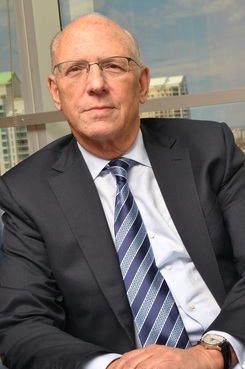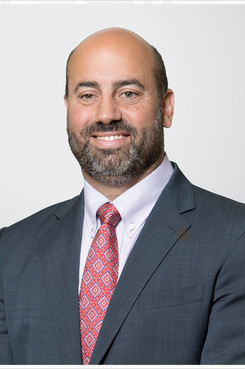How Holland & Knight Built a Philadelphia Office on Reed Smith Talent
The firm capitalized on Reed Smith's shifting priorities to grow from zero to more than 30 lawyers in Philadelphia in a flash.
September 19, 2018 at 10:00 AM
9 minute read
 Philadelphia. Photo: Shutterstock
Philadelphia. Photo: Shutterstock
When he launched an unsuccessful bid to be named global managing partner of Reed Smith in 2014, John Martini ran on a 10-point strategic plan for the future direction of the firm.
Four years later, in a meeting with Holland & Knight, he had a moment of déjà vu. “They hit every one of those key issues” from his 10-point plan, he said.
The meeting was a turning point for Martini, who became executive partner of Holland & Knight's Philadelphia office when the firm recruited him from Reed Smith in July.
His partners, Kerry Halpern and David Pardys, initially led the charge in finding a new firm for their employee benefits and executive compensation practice, Martini said.
But the group grew quickly.
Now, just over two months after Martini, Halpern and Pardys were part of an initial wave of partners launching the firm's new office, Holland & Knight has well over 30 lawyers in its Philadelphia office, most of whom came from Reed Smith. Several Reed Smith lawyers in California and New York have jumped to Holland & Knight as well.
Conversations about lateral movement had picked up in Reed Smith's Philadelphia office in recent years, Martini said, as the Pittsburgh-born firm became increasingly focused on global growth.
 Steven Sonberg. Courtesy photo.
Steven Sonberg. Courtesy photo.Holland & Knight, meanwhile, had its eye on Philadelphia as part of a domestic expansion strategy. The firm had talked to a group of lawyers there several years ago about starting an office, and another group at the end of 2017, both from other Big Law firms, but neither panned out, managing partner Steven Sonberg said.
Martini's group learned of that interest through a headhunter, Martini said. Holland & Knight saw his group's employee benefits practice as a good fit. And the Florida-based firm's geographic focus and origination system caught the attention of Martini, Halpern and Pardys.
“We just generally hit it off with them,” Sonberg said.
Taking the Leap
Martini said he and his partners “got along well” with senior management at Reed Smith, and there was no one thing leading to their decision to leave. But over time, he said, his colleagues noticed that the firm's priorities had shifted from the direction their practice needed to take.
“They came to me and said our practice would probably fit better at a firm with a different model,” Martini said. “There was also a lot of investment overseas [at Reed Smith], and that was something that didn't really fit our practice.”
The exits to Holland & Knight started with employee benefits, but quickly grew to include corporate lawyers—something Martini said was key to opening a new office—and other practices. Several of those lawyers were mainstays at Reed Smith.
Leonard Bernstein had been Reed Smith's Philadelphia office managing partner. Sara Begley was the firmwide head of the Women's Initiative Network. Mark Melodia, in New York, co-chaired the firm's technology and data practice.
Martini was vice chair of Reed Smith's business and finance group and chair of its executive compensation and employee benefits practice. Another partner to make the move, Paul Jaskot, co-led the corporate and securities group at Reed Smith, and was also the lead director of the firm's executive committee.
More than a third of the group had been at Reed Smith for a decade or more. For Begley, Bernstein, Melodia and litigation partner Carolyn Short, it had been well over two decades.
“We all felt a large sense of obligation to Reed Smith,” Martini said. “But there was a difference in what we perceived to be the direction of the firm and what we perceived to be best for our practices.”
 John Martini. Courtesy photo.
John Martini. Courtesy photo.Reed Smith global managing partner Alexander “Sandy” Thomas said moves from firm to firm are becoming the legal industry norm.
“We don't love to see partners that have been with us for some time make a decision that they need to go to another firm,” Thomas said. “Each person has his or her own individual interests to take into account.”
But, he said, Reed Smith has hired 50 partners and counsel so far this year. That includes a sizable group from Norton Rose Fulbright, which allowed the 1,550-lawyer firm to add an office in Austin. The group that left for Holland & Knight, Thomas said, made up a small percentage of the firm.
As for Martini, Thomas said, “I think it's natural for someone who wanted to lead a law firm to take his ambitions to a different platform. That seems natural.”
New Generation
In addition to Holland & Knight's more domestic focus, another draw was the firm's client management policy, Martini said. At their former firm, he said, each client is “owned” by a designated relationship partner.
“We don't have clients owned by any one lawyer. We encourage people to have relationships and we really do things on a matter level rather than the client level,” Sonberg said. “It gives opportunities for people to build their practices through relationships.”
Holland & Knight's approach, Martini said, “serves our team, particularly the next generation, better.”
One of the members of that generation is partner Nipun Patel, who has spent his entire 10-year career at Reed Smith, until now. He was a summer associate there, and at the time of his election to partner three years ago, he was Reed Smith's youngest partner. As he wound up the first decade of his career, he said, he started thinking about what the next three or four decades would bring.
“I'm a trial lawyer and commercial litigator who has done cases nationally. A firm with a stronger emphasis on domestic growth was a better fit for me building my practice over the next 30, 40 years,” he said. “I wasn't necessarily in need of a big London presence or Hong Kong presence or Abu Dhabi.”
Joining Holland & Knight also meant having a hand in building a new law office, Patel said, and being part of a firm that's “more intentionally collaborative.” Origination is viewed matter-by-matter, Patel said, and that opens up opportunities for entrepreneurial, young lawyers.
So when Martini approached him with the prospect of joining Holland & Knight, Patel said, “I made the decision and I didn't look back.”
He was in the first group of 11 partners that planted Holland & Knight's Philadelphia flag. And he became part of the effort to grow the office, approaching partners he had worked with at Reed Smith.
Several partners from the later group of laterals—Begley, Melodia and Short in particular—highlighted their wish to keep working with those who had already moved, even from different practice groups. Begley referred to Patel as her “right hand.”
Melodia, while primarily driven to move by a conflict at Reed Smith, said he had historically worked closely with lawyers in the financial industry group, including Bernstein, Travis Nelson, Robert Jaworski and Andrew Soven, and he had more recently worked with Patel on a data breach litigation.
“I was at Reed Smith for 29-and-a-half years,” Short said. “I don't think I would have done this on my own, but to come to a place where you have worked with people for a long time, and to start something new, is a very exciting proposition.”
Local Commitment
Despite the recent defections, Thomas said Reed Smith remains “100 percent committed to” the Philadelphia market, where it has over 100 lawyers.
He said the firm's industry sector focus has led it to seek growth in its labor and employment and corporate practices, which means investment in “markets like Philadelphia.” Reed Smith has made 10 hires in Philadelphia this year, including one partner, according to ALM's Legal Compass, which tracks lateral moves.
Still, the firm's largest office is now in London. About a third of its 153 hires this year, according to Legal Compass, were outside the United States.
Holland & Knight opened an office in London by acquisition in 2016, and has otherwise been focused on growing in the U.S. and Latin America. In the past five years, the firm has opened offices in Dallas, Mexico City, Austin, Houston, Charlotte, Denver, Anchorage and Stamford.
In each new market, Sonberg said, the firm looks for a space that could “accommodate any opportunities that might arise.” Martini said the new office at the Cira Centre in Philadelphia is big enough for the group he brought on, but whether they stay there permanently is undetermined.
Opening in that many new markets in just a few years may seem difficult to manage, but Sonberg said he doesn't attempt to do it all from the top.
“One of the comments we tend to make to people in our offices, including the executive partner … is they know [their] markets better than we know [their] markets. They know people who have been successful in the city better than we do,” Sonberg said. “We try to let the offices have a fair amount of input.”
The Philadelphia expansion has been similar to that of Dallas, he said, where it started with “a fairly large group,” followed by gradual additions later. As the firm has expanded to new cities, he said, it has stayed focused on its core practices, rather than branching out for geography's sake. Waiting to get that practice mix right is what kept the firm from opening in Philadelphia earlier, he said.
Since July, Martini said, more clients have made a move to Holland & Knight than he expected, and two new clients have come on board. Some stayed with Reed Smith, he acknowledged, and his group continues to send and receive referrals to and from Reed Smith. Now he and his partners are beginning to tap into connections with other offices at Holland & Knight, he said.
“The group as a whole has been very busy, and I think that's going to continue, and that's independent of Reed Smith,” Martini said. “It's not us against them.”
This content has been archived. It is available through our partners, LexisNexis® and Bloomberg Law.
To view this content, please continue to their sites.
Not a Lexis Subscriber?
Subscribe Now
Not a Bloomberg Law Subscriber?
Subscribe Now
NOT FOR REPRINT
© 2025 ALM Global, LLC, All Rights Reserved. Request academic re-use from www.copyright.com. All other uses, submit a request to [email protected]. For more information visit Asset & Logo Licensing.
You Might Like
View All


'The World Didn't End This Morning': Phila. Firm Leaders Respond to Election Results
4 minute read
Settlement With Kleinbard in Diversity Contracting Tiff Allows Pa. Lawyer to Avoid Sanctions
3 minute readTrending Stories
- 1'A Death Sentence for TikTok'?: Litigators and Experts Weigh Impact of Potential Ban on Creators and Data Privacy
- 2Bribery Case Against Former Lt. Gov. Brian Benjamin Is Dropped
- 3‘Extremely Disturbing’: AI Firms Face Class Action by ‘Taskers’ Exposed to Traumatic Content
- 4State Appeals Court Revives BraunHagey Lawsuit Alleging $4.2M Unlawful Wire to China
- 5Invoking Trump, AG Bonta Reminds Lawyers of Duties to Noncitizens in Plea Dealing
Who Got The Work
J. Brugh Lower of Gibbons has entered an appearance for industrial equipment supplier Devco Corporation in a pending trademark infringement lawsuit. The suit, accusing the defendant of selling knock-off Graco products, was filed Dec. 18 in New Jersey District Court by Rivkin Radler on behalf of Graco Inc. and Graco Minnesota. The case, assigned to U.S. District Judge Zahid N. Quraishi, is 3:24-cv-11294, Graco Inc. et al v. Devco Corporation.
Who Got The Work
Rebecca Maller-Stein and Kent A. Yalowitz of Arnold & Porter Kaye Scholer have entered their appearances for Hanaco Venture Capital and its executives, Lior Prosor and David Frankel, in a pending securities lawsuit. The action, filed on Dec. 24 in New York Southern District Court by Zell, Aron & Co. on behalf of Goldeneye Advisors, accuses the defendants of negligently and fraudulently managing the plaintiff's $1 million investment. The case, assigned to U.S. District Judge Vernon S. Broderick, is 1:24-cv-09918, Goldeneye Advisors, LLC v. Hanaco Venture Capital, Ltd. et al.
Who Got The Work
Attorneys from A&O Shearman has stepped in as defense counsel for Toronto-Dominion Bank and other defendants in a pending securities class action. The suit, filed Dec. 11 in New York Southern District Court by Bleichmar Fonti & Auld, accuses the defendants of concealing the bank's 'pervasive' deficiencies in regards to its compliance with the Bank Secrecy Act and the quality of its anti-money laundering controls. The case, assigned to U.S. District Judge Arun Subramanian, is 1:24-cv-09445, Gonzalez v. The Toronto-Dominion Bank et al.
Who Got The Work
Crown Castle International, a Pennsylvania company providing shared communications infrastructure, has turned to Luke D. Wolf of Gordon Rees Scully Mansukhani to fend off a pending breach-of-contract lawsuit. The court action, filed Nov. 25 in Michigan Eastern District Court by Hooper Hathaway PC on behalf of The Town Residences LLC, accuses Crown Castle of failing to transfer approximately $30,000 in utility payments from T-Mobile in breach of a roof-top lease and assignment agreement. The case, assigned to U.S. District Judge Susan K. Declercq, is 2:24-cv-13131, The Town Residences LLC v. T-Mobile US, Inc. et al.
Who Got The Work
Wilfred P. Coronato and Daniel M. Schwartz of McCarter & English have stepped in as defense counsel to Electrolux Home Products Inc. in a pending product liability lawsuit. The court action, filed Nov. 26 in New York Eastern District Court by Poulos Lopiccolo PC and Nagel Rice LLP on behalf of David Stern, alleges that the defendant's refrigerators’ drawers and shelving repeatedly break and fall apart within months after purchase. The case, assigned to U.S. District Judge Joan M. Azrack, is 2:24-cv-08204, Stern v. Electrolux Home Products, Inc.
Featured Firms
Law Offices of Gary Martin Hays & Associates, P.C.
(470) 294-1674
Law Offices of Mark E. Salomone
(857) 444-6468
Smith & Hassler
(713) 739-1250





